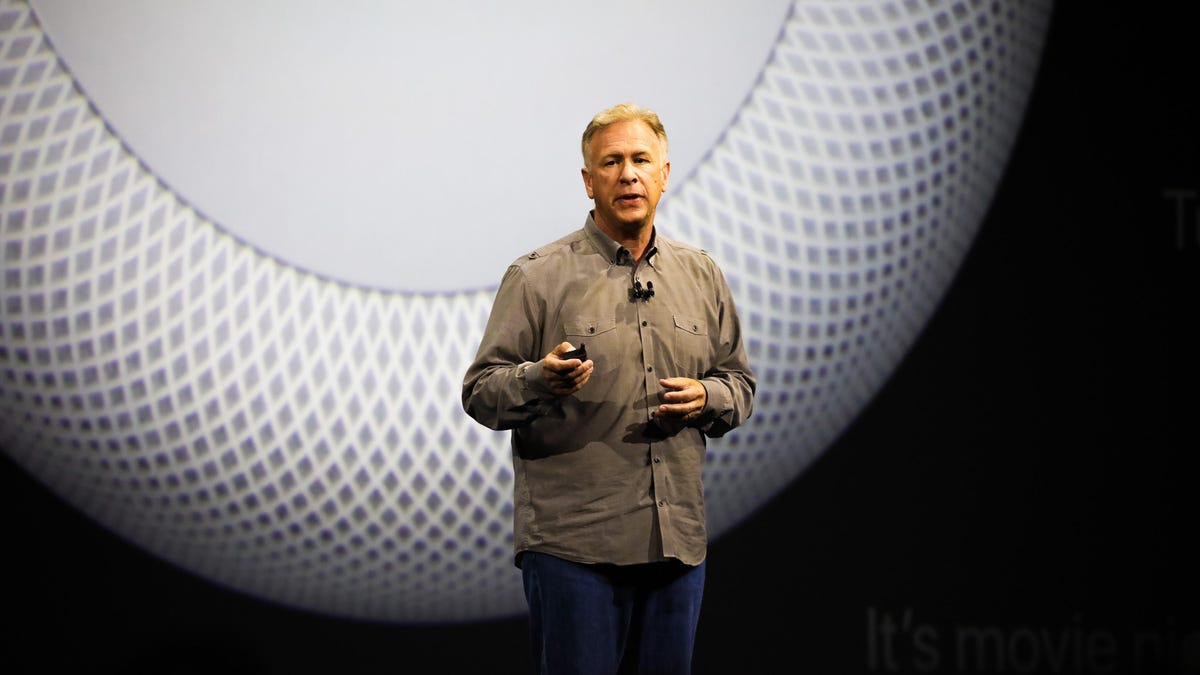Apple HomePod likely a no-show at CES, but it could win anyway
The company delayed the release of its smart speaker, missing holiday shopping and potentially CES. Yet, it’s still hard to count out Apple.

Phil Schiller, Apple's marketing chief, showing off the HomePod at this year's WWDC.
Apple was planning to make a big splash in the smart speaker world this month with the release of its new $349, Siri-powered HomePod . Instead, the tech giant punted, postponing the launch until early next year.
The delay delivered a quick one-two punch to Apple. The company ceded the holiday shopping season to competing voice-activated speakers, namely the Amazon Echo and Google Home . And the HomePod may also lose out on valuable buzz and partnerships from January's CES , the nation's biggest tech show.
Here's the thing, though: If this situation involved any other company, its product might be doomed. But Apple has the ability to overcome these obstacles and make the HomePod a success anyway, industry watchers say. Heck, it may even benefit from the delay.
"They won't launch it during the mass hysteria of the holiday season," said Brian Blau, a consumer tech analyst for Gartner. "They'll probably launch it when they have all the attention for themselves, and maybe that will be an opportunity to be gained."
Apple representatives didn't respond to a request for comment for this story.
The latest twist for the HomePod comes just ahead of another CES show that will likely have digital helpers like Amazon's Alexa, which powers the Echo speaker, taking center stage. At CES a year ago, Alexa enjoyed a wave of attention, helping it cement a leading position in the voice assistant market. A slew of companies announced plans to bring Alexa to their products, including Ford cars, Dish set-top boxes and Lenovo speakers. Assistants are poised to dominate again this year, with Samsung's Bixby and Google Assistant getting in the mix.
Apple may be conspicuously absent from the festivities, but there are plenty of reasons why that may not hurt the HomePod.
The company is often late to offer new devices or features, letting other companies go first and sometimes reveal pitfalls that Apple can avoid. Apple used that blueprint to turn its Apple Watch, AirPods and Apple Pay payments service into leaders in each of their markets. A decade ago, the original iPhone offered a polished, easy-to-use alternative to the clunkier smartphones already in the market.
Apple can also rely on its loyal followers to show up when it releases a new product, even if it's late or in short supply.
"I don't think that it necessarily has that much of a downside for Apple," Francesco Radicati, an independent analyst focused on smart home products, said of the delay. "Apple devices come with this built-in fan base that's going to buy the device."
The company may also benefit from targeting a higher end of the market, pricing its speaker at $349, compared to $150 for the Amazon Echo and $130 for the Google Home. At that price, the HomePod probably won't be a high-volume seller, but it could become another lucrative side business to support iPhone sales.
Apple is also emphasizing the HomePod's audio capabilities, not Siri's voice controls. This cuts down on the need for Apple to team up with makers of thermostats and fridges so the HomePod can become another smart-home hub like the Echo or Home, analysts said.
Despite those benefits, Apple's success is no sure thing. Amazon and Google are taking advantage of Apple's absence and selling as many of their own speakers as they can. During this holiday season, both companies slashed the prices for their speakers, selling their cheapest ones for just $30 each. The thinking is that if you have one smart speaker, you're not likely to switch brands and buy another.
Additionally, researchers at Adobe have found Apple's Siri to be a less capable smart assistant, which could dampen interest in the HomePod.
"Clearly it seems to be a tug of war between Alexa and Google Home," said Mihir Kittur, co-founder of Ugam, a retail analytics firm. "People don't seem to be talking much about Siri as far as voice shopping."
For now, though, many smart speakers are still buggy, Blau said, with the devices responding to users at the wrong times or answering questions with inaccurate information. Given that these speakers are still new and developing, Apple has an opportunity to use its delay to add more features, polish its product and come out with something potentially better than what's already out there.
At least, that's probably what the company is hoping to do. It may even trim the HomePod's price to help the speaker compete against cheaper alternatives.
"Apple being Apple," Kittur said, "one should never discount them."
Apple: See what's up with the tech giant as it readies new iPhones and more.
Does the Mac still matter? Apple execs explain why the MacBook Pro was over four years in the making, and why we should care.

